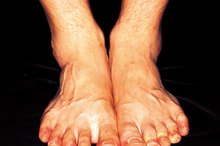What does fact checked mean?
At Healthfully, we strive to deliver objective content that is accurate and up-to-date. Our team periodically reviews articles in order to ensure content quality. The sources cited below consist of evidence from peer-reviewed journals, prominent medical organizations, academic associations, and government data.
The information contained on this site is for informational purposes only, and should not be used as a substitute for the advice of a professional health care provider. Please check with the appropriate physician regarding health questions and concerns. Although we strive to deliver accurate and up-to-date information, no guarantee to that effect is made.
Does Walking Help Get Rid of Excess Water in the Lungs?
Excess water in the lungs, also called pulmonary edema, may be caused by several conditions, most of which involve the heart 1. Symptoms include shortness of breath, wheezing, a feeling of suffocation, chest pain and heart palpitations. Work closely with your doctor to determine the cause of your edema, and ask his advice regarding following an exercise program.
If you are experiencing serious medical symptoms, seek emergency treatment immediately.
Walking and Acute Pulmonary Edema
If you have a condition that has caused pulmonary edema, it is important for you to rest and allow yourself to heal 1. Any type of exercise at this time, including walking, might make it even harder for you to breathe. Talk to your doctor about when you can resume your walking regimen. If you suddenly begin to develop the symptoms of water in your lungs or have trouble breathing, call 911 or have someone take you to the emergency room immediately.
- If you have a condition that has caused pulmonary edema, it is important for you to rest and allow yourself to heal 1.
Walking as Prevention
Is There a Natural Way to Get Rid of Fluid in the Body?
Learn More
If you have congestive heart failure, walking during the times that you are not retaining excess fluid may help prevent water from settling in your lungs 2. If you have been sedentary, build up your exercise regimen slowly and with your doctor's help. If you are overweight or obese, walking can help you lose weight, which in turn may reduce your risk of developing the heart problems that often lead to pulmonary edema 1.
Other Ways to Prevent Pulmonary Edema
If you have a heart problem, take all prescribed medications as directed by your doctor. Also, weigh yourself each morning. If you gain more than 2 lbs. in one day, call your doctor, as this may indicate that you are beginning to retain fluid. Strive to eat foods with low sodium levels, and talk to your doctor about how much salt is safe for you to consume. Have your blood pressure and blood cholesterol checked frequently.
- If you have a heart problem, take all prescribed medications as directed by your doctor.
Keeping Your Heart Healthy
Exercise to Improve Circulation in the Legs
Learn More
Since the most common cause of water in the lungs is heart failure, it makes sense to take the steps necessary to keep your heart healthy 2. If you are overweight or obese, lose weight. Do this by exercising daily and eating healthy foods in moderation. Don't smoke, and drink alcohol sparingly, if at all. Eat heart-healthy foods, such as fatty fish, fruits and vegetables. Find ways to keep your stress levels under control.
- Since the most common cause of water in the lungs is heart failure, it makes sense to take the steps necessary to keep your heart healthy 2.
- Do this by exercising daily and eating healthy foods in moderation.
Related Articles
References
- MayoClinic.com: Pulmonary Edema
- MedlinePlus: Heart Failure
- Merck Manuals. Pulmonary Edema - Cardiovascular Disorders.
- Murray JF. Pulmonary edema: pathophysiology and diagnosis. Int J Tuberc Lung Dis. 2011;15(2):155-60, i.
- Iqbal MA. Cardiogenic Pulmonary Edema. StatPearls [Internet]. October 2019.
- Sureka B, Bansal K, Arora A. Pulmonary edema - cardiogenic or noncardiogenic? J Family Med Prim Care. 2015;4(2):290. doi:10.4103/2249-4863.154684
- Schmickl CN, Pannu S, Al-Qadi MO, et al. Decision Support Tool for Differential Diagnosis of Acute Respiratory Distress Syndrome (ARDS) vs Cardiogenic Pulmonary Edema (CPE): A Prospective Validation and Meta-Analysis. Crit Care 2014; 18:659. doi:10.1186/s13054-014-0659-x
- Weintraub NL, Collins SP, Pang PS, et al. Acute Heart Failure Syndromes: Emergency Department Presentation, Treatment, and Disposition: Current Approaches and Future Aims: A Scientific Statement From the American Heart Association. Circulation 2010; 122:1975. doi:10.1161/CIR.0b013e3181f9a223
Writer Bio
Michelle Kulas worked in the health-care field for 10 years, serving as a certified nurses' assistant, dental assistant and dental insurance billing coordinator. Her areas of expertise include health and dental topics, parenting, nutrition, homeschooling and travel.








